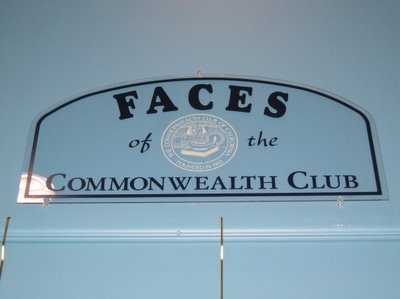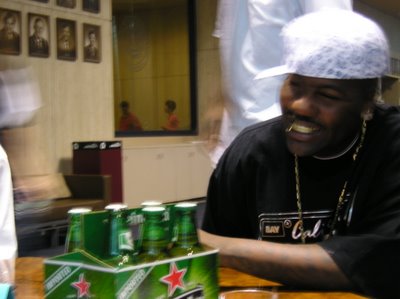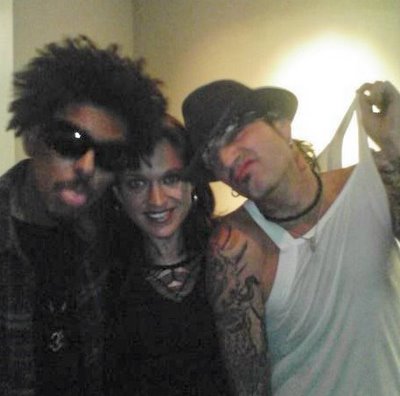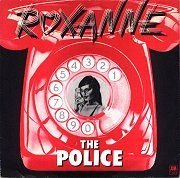[Originally published in Atlanta's Creative Loafing on 5/10]
Hyphy Fidelity
Crunk's roarin' cousin puts 'paint where it ain't'
BY TAMARA PALMER
"We relate to hyphy here in terms of it being the Bay Area version of crunk," says DJ Nabs of Hot 107.9 FM. "It doesn't really mean that we know what's going on there, though."
Even people in Northern California scratch their heads in amusement and confusion when it comes to hyphy, the term for the youth-driven hip-hop scene of the day. As undefinable as crunk, but just as simple to demonstrate, hyphy is a spirit. When someone is beyond hyper, dancing with the energy of a thousand Holy Ghosts and the wild abandon of a mosher at a Limp Bizkit concert, they're hyphy. While it lacks the combative aggression of L.A.'s krumping and clowning, even Tommy the Clown would appreciate seeing how the youngsters shake their dreadlocks and invent bold new steps.
Some of the slang phrases connected to hyphy -- including "go dumb," "get stupid," and the ever-popular "ride the yellow bus" -- allude to retardation. But with no genuine offense intended to those with mental challenges (though some kids outfit yellow buses with large rims and strap on helmets), the analogy is meant to encapsulate that crazy feeling of letting loose.
The dancing and music of hyphy is a modern outgrowth of the longtime streetcar culture of Oakland, most particularly from the impromptu gatherings called sideshows, where rubber burns under the heat of continual donuts and gas/brake dips. But it ain't some Southernplayalisticadillac cruising. On Peachtree, it's about preening and luxury flash, but in Cali, it's about ghost-riding the whip -- hanging out of, on top of, or dancing alongside cars that are "magically" driving themselves. The emphasis is on technical MacGyverism -- how many tricks can we make our old-ass hooptie do?
"I've never ridden in a car with hydraulics in my life; that's not what we do here, but we do have 'scrapers on dubs,'" says Clyde Carson, member of Oakland rappers the Team. Carson also recently launched Hyphy Juice, a "grapple" (grape and apple)-flavored rival to energy drinks like Nelly's Pimpjuice and Lil Jon's CRUNK!!!. He studies the business ventures of the biggest Southern and East Coast rap stars and applies it to marketing his Bay Area lifestyle. Hyphy Juice should help stoke a growing national interest in the music itself.
"Hip-hop is always evolving and it's always mutating -- it just mutated into hyphy," explains Too Short, the multiplatinum Oakland-bred rapper who has made Atlanta his home for more than a decade. "It just took on another leg, another arm. It's not really saying that this [alone] represents the Bay. It's just a dance, it's just an attitude; it's a movement. The dance is what brought the whole movement about, but an actual musical sound came up out of it. That's where I step in and go, 'Whoa, you're on to something.'"
"Musically, we put paint where it ain't," says Rick Rock, the producer credited with the club-driven sound of the movement (as well as hits by Jay-Z, Fabolous and Busta Rhymes). Rock has worked on many of the most loved tunes from the Bay Area's biggest rap star (and hyphy ambassador), E-40, and shared production duties with Lil Jon on 40's recent album My Ghetto Report Card, which debuted at No. 3 on the Billboard charts -- a first for the artist.
Rock's proteges Federation, the trio behind the 2003 Bay Area hit "Hyphy," recently signed with Warner Bros. after a bidding war that also included J Records and Universal, among others. "Hyphy" set the sound of hyphy in place: high energy, like crunk kicked in the groin and ready to wild out. Like Lil Jon, versatile studio wizard Rock knows the key to longevity is to continually reinvent his sound while maintaining a certain vibe, especially as others are frantically biting the hyphy records he made more than three years ago.
DJ Nabs says that, beyond E-40 and Lil Jon hooking up for Report Card, the hyphy sound is still nonexistent in the local ATL clubs and on the airwaves. And that may not change unless the artists and the music are cleverly marketed.
"I don't think that's a slight to the Bay Area," he says. "It's just that people's regional sounds take precedence over other people's regional sounds." Little surprise, given Atlanta's national reputation for supporting its homegrown talent on the radio considerably more than other regions do.
It might not be an easy road to national acclaim, but there is still tremendous business potential for enterprising Bay Area artists in the hyphy movement -- just look at Clyde Carson and Hyphy Juice. Years after Dirty South artists followed the blueprints of the independent rap hustle of Too Short and his Bay Area brethren, it's now kids in Oakland looking to Atlanta for strategies of success.
"I'm trying to be a guiding light to these youngsters," says Too Short. "I'm like, 'Man, don't make the wrong decisions. Don't sign stupid contracts, don't let nobody else get your money and jack it off.' I'm thinking like that. Don't turn the hyphy into a dance that comes and goes. Turn this into a business that supports families and kids and generations. It's somebody's kids going to go to college because of crunk music. Somebody's kids are gonna get a trust fund because of crunk, you know what I'm saying? Let's do that with the hyphy."




